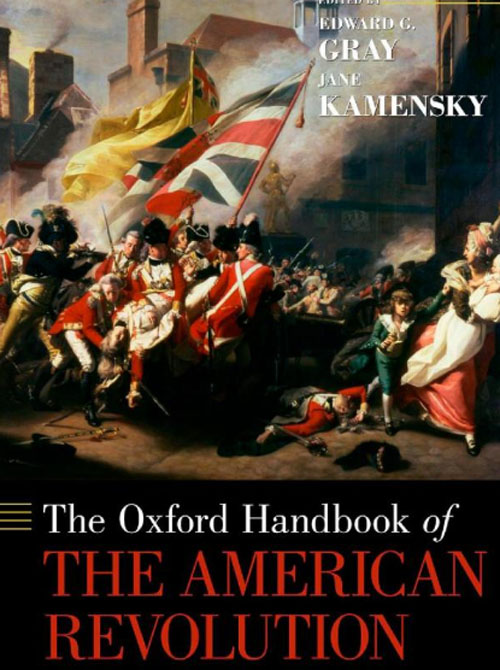The Oxford Handbook of the American Revolution
Review

The Oxford Handbook of the American Revolution (Oxford University Press, New York, 2013), pp. 673 Edward Gray and Jane Kamensky (Eds.)
The Oxford Handbook of the American Revolution presents the reader with a range of new scholarship on a complex and dynamic subject, covering a chronological period ranging from pre-war colonial America to the establishment of the victorious new republic. In the thirty three essays which comprise the volume, a range of prominent scholars from both sides of the Atlantic reflect on the antecedents, experience, and legacy of the conflict and offer new interpretations designed to cut across established dichotomies and paradigms.
Rather than focus narrowly upon the experience of white patriots, the authors explore the worlds of Native Americans, Blacks, Women and Loyalists, expanding the terms of reference for this event and stressing the multiplicity of roles and agendas which were pursued by those who lived through it (and by the many who didn't). Certain of the essays also explore the notion of an (patriot) American elite and debate when precisely such a group emerged. As an anthology, no single interpretation is preferred to any other and many of the essays characterise the colonial and post-colonial world in fundamentally different terms. Yet, rather than being discordant, the effect encourages the reader to think about the continuities between the arguments and the volume functions well as a platform for future post-revisionist syntheses.
In addition to the focus on different groups, the authors also expand the scope of the scholarship by challenging ideas of time and place. Effort is taken to place the revolution in its imperial and international context; both as regards its causes and consequences. A similar level of attention is also placed on the geographical arenas in which the revolutionary ideal was initially propagated and subsequently contested - particularly significant being the distinction between urban, rural and peripheral spaces. The more of the essays one reads, the more apparent it becomes that assigning a set of dates to the revolution depends entirely upon who is being talked about and where they are physically. A merchant and solider of the period had very different conceptions of when the revolution started, what they fought for, and (accordingly) when/whether their respective struggles ended.
The Oxford Handbooks are intended to provide scholars and graduate students with an up-to-date survey of research in a given field, and the price of the volumes reflect that. However, for the student or the teacher they are undoubtedly worth the investment. This volume assumes very little prior knowledge and the essays are easily digestible. This is thoroughly researched, genuinely entertaining and thought provoking scholarship - a must for anyone seriously interested in the period.

